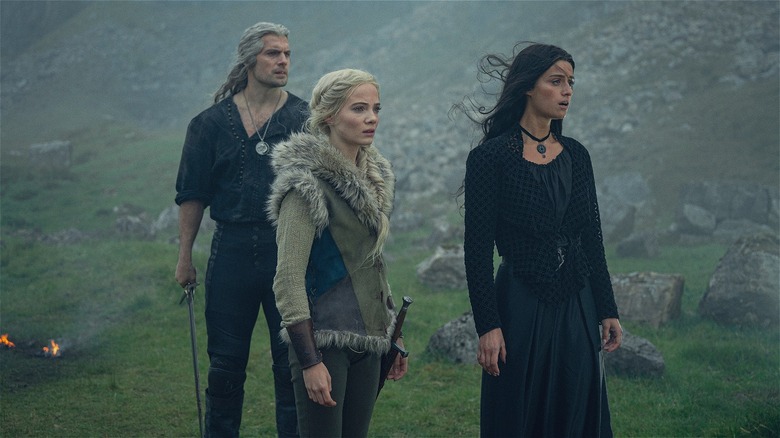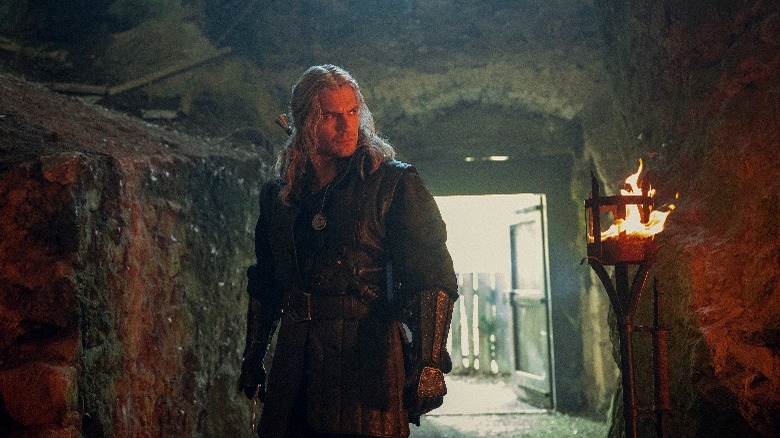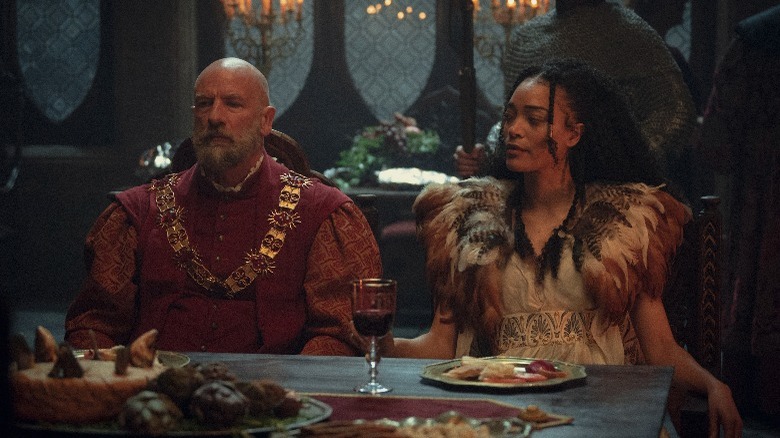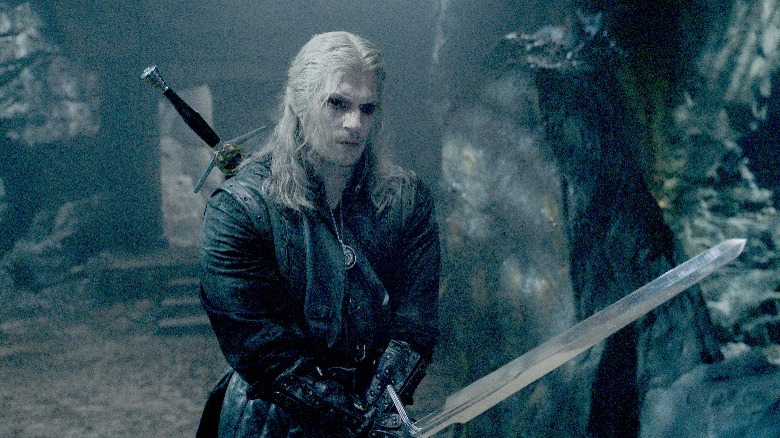The Witcher Season 3 Review: An Ambitious, Mostly-Satisfying Foray Into Andrzej Sapkowski's World
Polish fantasy writer Andrzej Sapkowski's "The Witcher" novel series is as richly layered and narratively intricate as it gets. Boasting a string of infinitely interesting, deeply-flawed characters, "The Witcher" saga deftly flits from deeply personal dilemmas to national war stratagems while retaining its wondrous high-fantasy element at its core. Considering the depth that Sapkowski effortlessly imbues throughout the course of his six novels, a faithful series adaptation would rightfully be regarded as a rather ambitious undertaking. While Netflix's "Witcherverse," created by Lauren Schmidt Hissrich, has tried to embody the source material's essence in its first two seasons, the results have been middling, with much left to be desired.
There is no set formula for creating a good adaptation that does justice to its source material, as the variables in every narrative setting are ever-changing. However, having said that, the problems with Hissrich's "The Witcher" series so far are pretty easy to parse: the series has a chronic tendency to sideline its rich source material in favor of clichéd fantasy tropes, yielding mixed results in the process. Thankfully, the latest two-part season of "The Witcher" essentially changes the name of the game by leaning heavily into the best kinds of Sapkowski-isms while also retaining its identity as a compelling, worthwhile adaptation.
Ample amounts of creative liberties are still taken when it comes to canon events — some of which might come off as baffling at first — but the story finds a way to embrace its own eccentricities and do right by its characters this time around. While season 3 is no perfect puzzle box, its pieces eventually fall into place, revealing a thrilling grander picture about the possible end of worlds and the rise of new monstrosities.
Deliciously complex moral dilemmas
To be a witcher is to walk the path of deliberate neutrality, and Geralt of Rivia (Henry Cavill) is aware of how dangerous it is to meddle in the world's torrid affairs. However, this deliberate choice is repeatedly challenged throughout Geralt's journey in the books, a sentiment that has been expertly captured in "The Witcher 3: Wild Hunt," CD Projekt Red's video game adaptation of the source material. In a world rife with constant in-fighting and national-level conflicts, impossible moral choices emerge as the norm.
With the series finally approaching a climatic stage, Geralt is forced to rethink his neutrality, as the fate of his loved ones depends on difficult, complex choices. These moral dilemmas also extend to Ciri (Freya Allan) who is now more aware of her Elder Blood status, and must choose what role she will play in shaping the future of The Continent. In the two seasons so far, Ciri's powers have always felt haphazard and vague, with no true emphasis on what it means for her, and the horrible toll such a burden can take on a person. Season 3 is quick to flesh out this crucial aspect, as it allows Ciri to be lost and conflicted about her purpose, as she yearns for a more quiet, simpler life.
However, the central moral dilemma is presented with a contrarian impulse: Ciri also wants to use her powers for good without being used as a pawn in someone else's game. While this seems like a small ask, it is an impossibility in a world where various factions wish to covet her for their own gain. The only exceptions are Geralt and Yennefer (Anya Chalotra), who are caught in their own moral labyrinths while trying their best to grant Ciri the autonomy she deserves.
Sidelined characters assume the spotlight
The primary goal of this narrative junction is to keep Ciri safe and prepare her for what's to come, as The Wild Hunt is already on her heels, eager to taste her powers. Aretuza assumes central importance in this situation — after all, this is where the Thanned coup takes place, leading to a catastrophic outbreak of violence that rips the Brotherhood of Sorcerers apart. The reasons for the Thanned ball taking place are a significant departure from the books — admittedly, the results aren't as effective as they should have been — but the climax of this event unfolds in ways that are fitting within the context of the setup.
Characters like Dijkstra (Graham McTavish) and Philippa Eilhart (Cassie Clare) are allowed to emerge from the shadows and orchestrate events with the brand of cunning manipulation they're best known for, while Vilgefortz (Mahesh Jadu) finally sheds the mask of benevolence he has been wearing so far. There's also Radovid (Hugh Skinner), who is yet to become the mad king ordering witch hunts and ruthless destruction — here, he is yet another conniving player in the game, almost too sweet in comparison to his book counterpart. While this is subject to change, his involvement sets the stage for personal conflicts that extend to the political in the near future.
The conclave of Mages, and the ball that precedes it, are the narrative meat of season 3, executed with a commendable theatrical flourish and twists that work in favor of the show. However, the focus also shifts to characters who had very little to do in season 2: for instance, Cahir (Eamon Farren) is invested with appropriate depth to underline his tragic circumstances, where loyalty and survival become more interlinked than one might think.
The monsters are more than obligatory inserts, and more
Monster-hunting is an integral part of "The Witcher," as Geralt and Ciri hinge a part of their identities on this essential, yet thankless job. There are some badass fight sequences where Ciri is given a chance to hold her own and flaunt her witcher abilities, with Geralt granting assistance when needed. This role reversal is crucial for Ciri's sense of confidence, which literally decides her fate in "Wild Hunt" — if Ciri's sense of autonomy is stifled and decisions are made for her by Geralt, it can spell literal disaster in the game's final outcome. In a surprisingly welcome turn of events, the series follows the game's lead and lets Ciri be her own person, with the others gently guiding her throughout her journey.
Some monsters serve a greater purpose apart from being ingredients in a cool witcher fight scene, as they directly tie into the origins of imposter Ciri, who is also indispensable to the grander plot. Some decisions in this respect might raise a few eyebrows, but there is a clear attempt to deepen character origins and lore without interfering with broad canon events. Unless you're a Sapkowski purist, these choices, although imperfect, work.
While Cavill is ever-compelling as the white-haired witcher, capable of balancing gentleness and brutality in equal measure, Allan and Chalotra genuinely elevate this season with the rich complexities they bring to their roles. Yennefer has always been a rather complicated figure — extremely flawed, with some skeletons in her closet — and Chalotra delivers these nuances with striking vulnerability. However, Allan's Ciri is easily this season's highlight, as we visibly witness her character grapple with the meaning of true, unbridled power. Whether she wants to be a princess, the savior of the Elves, or a wandering witcher, the choice is hers to make. And that makes all the difference in the world.
/Film Rating: 7 out of 10
Volume 1 of "The Witcher" Season 3 premieres on June 29, 2023, on Netflix.



